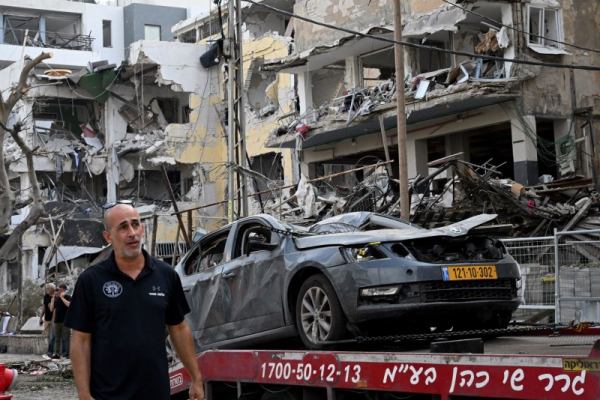Israel-Iran war could be last crusade against state-sponsored violence


A man removes a destroyed car at the site where an Iranian ballistic missile hit Tel Aviv on Monday. Iran has fired waves of drones and missiles into Israel. Photo by Debbie Hill/ UPI | License Photo
Unlike its Lebanon intervention in 1982 and the current conflict in Gaza, the principal wars Israel fought were very short and one sided: 1956, 1967 and 1973.
How long the current battle with Iran lasts and how it ends are unlikely to be decided after a few days of fighting and aerial combat. But among the “unknown unknowns” former U.S. Secretary of Defense Donald Rumsfeld was fond of assessing, here is one to consider.
Is this war possibly the last crusade against state-sponsored religious violence and radical Islam? Crusade is an inflammatory word. But with the destruction of Hezbollah, the defeat of Hamas and the overthrow of the Assad rule in Syria, Iran was increasingly vulnerable.
That also means that its form of radical Islam has been weakened. That does not mean ISIS, al Qaeda and other radical groups are less threatening. They are, however, if Iran is defeated or neutered without broader cover and thus greatly weakened.
The Sunni Gulf Arabs have agreed at least to a de facto detente with Israel. The other large Muslim states, namely India and Pakistan, are disinterested in this battle. And Egypt signed a peace deal with Israel more than 50 years ago.
Suppose that Iran is forced to reach some settlement over its nuclear weapons programs and abandon its policy of “death to Israel (and the United States and the United Kingdom)” that is enforceable.
Whether this is possible, consider the implications. Fundamental Islam will now lack the means to continue its fight against the West and against Israel. The Jihad that began on Sept. 11 may not be officially over. It will be on life support.
Now, if this speculation of “unknown unknowns” is correct, Israel’s campaign against Iran takes on a broader context — removing the danger of violent Islamic radicalism.
Some in the United States will use this possibility as the rationale for America to take up arms with Israel. That would be a catastrophic blunder likely to turn much of the Muslim world further against the United States. But it does mean that influencing how the war ends is of far greater importance.
It is becoming increasingly clear that Israel’s aims go well beyond ending Iran’s nuclear and ballistic missile weapons programs. Jerusalem may not call for regime change. However, it is hard to see from Israel’s position how the current regime could be trusted to honor or accept any agreement.
And given more than 1,000 miles of separation between the two warring countries, neither bombing Iran into submission nor physically occupying it is achievable.
President Donald Trump has sensibly called for an end to the war. He also has demanded Iran forgo any and all nuclear weapons aspirations and capabilities. However, is there any chance that outside intervention by the United States could lead to an end to the war?
In 1973, Egyptian President Anwar Sadat’s brilliant strategy was to cross Suez into the Sinai, which had been occupied by Israel since 1967, as a way of forcing negotiations. It succeeded masterfully.
There is no equivalent Sinai here. And Israel seems to be prevailing in the bombing exchanges in imposing more damage to Iran than Iran to Israel. However, that is not a path necessarily leading to victory.
The terms of an agreement would allow Iran to maintain a peaceful nuclear power industry under an even closer and more intimate inspection regime and to recognize Israel. Then, the Gulf states would follow suit. The obvious questions are what would coerce or convince the current regime to drink from this “poisoned chalice,” as Khomeini was forced to do in ending the war with Iraq, and what incentives could be offered?
Regime survival would be one. While that would not do much for an oppressed public dissatisfied with ayatollah rule, it would relieve the major source of conflict in the region. Still, this seems very much very wishful and even naive thinking.
As history has shown, regime change since World War II has proven disastrous for U.S. policy objectives. But could an outcome be achieved in which Iran could accept the existence of Israel? We will not know until we try.
So Mr. Trump, one of your prerequisites for peace is for Iran to accept Israel’s existence and forgo all threats about its destruction. That can only be achieved by extensive surveillance of Iran’s nuclear facilities. But were this to be achieved, it could be, ironically, the last crusade.
Harlan Ullman is UPI’s Arnaud de Borchgrave Distinguished Columnist; senior adviser at Washington’s Atlantic Council, chairman of a private company, and principal author of the doctrine of shock and awe. His next book, co-written with Field Marshal The Lord David Richards, former U.K. chief of defense and due out next year, is Who Thinks Wins: Preventing Strategic Catastrophe. The writer can be reached on X @harlankullman.